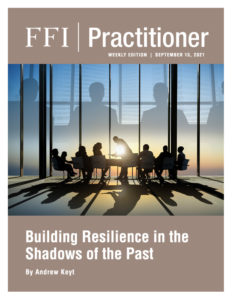
View this edition in our enhanced digital edition format with supporting visual insight and information.
This week’s edition continues the series of editions by presenters at the in-person 2021 FFI Global Conference, with an article by Andrew Keyt, who will be presenting alongside Dr. Fabian Bernhard at the conference on October 21. Thanks to Andrew for this article on how advisors can help families build resiliency in next gen successors.
The challenges of the last 18 months have taught us many things, perhaps nothing more important than the need to be resilient — the ability to respond and rebound from a crisis stronger and more resourceful than before.
During our session at the upcoming FFI Global Conference in London, my colleague, Dr. Fabian Bernhard and I will share what we have learned through both research and practice about the stories our family businesses clients tell and how these stories impact the growth and development of the next generation.
The truth is that successors in a family business are born into a story that is already being told about the greatness of their parents, grandparents, and the enormous legacies that have been built. Often, families tell the stories of success, while the stories of failures fall by the wayside. The result is that these stories create a mythology around the family and the business that can be a blessing or a curse.
The stories can be a blessing because they give next gen family members a sense of meaning and purpose, providing a sense of hope that each generation can overcome big challenges. Conversely, these stories can be a curse, making it difficult for a successor to find a sense of credibility and identity. How families talk about their history can either help or hinder the growth of the next generation.
The Successors Curse
The “Successors Curse,” a term first introduced in my book, Myths and Mortals (2016), is that the accomplishments of the successor are always compared to the family members that came before. When successors fail, those around them might say, “They can never be as good as their father.” However, when they succeed, those around them might say, “That’s great, but it’s nothing compared to what their mother did.”
At its worst, the Successors Curse causes successors to feel immense pressure to repeat their parents’ success and undermine their ability to build credibility – both internal credibility (belief in themselves), as well as their external credibility (with others). It is this sense of credibility and confidence that lies at the heart of resiliency.
Successors who get caught in the shadows of the senior generation tend to exhibit more of the stereotypical behaviors of the entitled, immature, spoiled successor memorialized in movies like “Tommy Boy.”1 The result is that these successors often:
- Can be volatile and highly emotional in conflict
- Crave the approval of others
- Become defensive and highly emotional when criticized
- Allow others to excessively influence their decisions
- Preserve their own ego at the expense of others
- Take credit to feed their egos
- Exhibit a sense of entitlement
These behaviors can inhibit the ability to build resilience within an organization. So, what can advisors do to help their clients who exhibit these tendencies?
Overcoming the Curse: Building resiliency
While standing in the shadows of your family history can feel daunting, my research shows that to counteract the effects of the Successors Curse and build a sense of resiliency, a successor must pursue what psychologist Murray Bowen called, “Differentiation.” Simply put, differentiation is the process during which children develop individually to stand separate and apart from their parents (e.g., having different opinions, making choices that their parents wouldn’t make) while staying connected to them.2
This is not something that a child does just once. Differentiation is something that people work on over time, gradually increasing their sense of self and self-confidence.
Case Study: Bill Wrigley Jr.’s pursuit of differentiation3
Being a successor in a family business as iconic as the William Wrigley Company can make one feel the weight of immense responsibility. At the age of 28, and newly named as Assistant to the President, Bill Wrigley Jr. was feeling the weight of future leadership. His father had a reputation of being on top of every little detail, and his job was his life. The saying within Wrigley was that if you wanted to change the color of the carpet in China, you needed to go to Bill’s father. And Bill was trying to emulate his father’s style of leadership.
In 1991, Bill was put in charge of Wrigley’s Canadian operations and was leading Wrigley’s expansion efforts into India. On one day, he was in London trying to negotiate a deal with the Indian partners while simultaneously managing the details of the business in Canada. As he remembers it, “I was running around… trying to be like my dad.”
The emotional pressure of trying to replicate his father’s successes bore down on him until Bill had to withdraw from the meeting, feeling ill. When the meeting was over, Bill thought to himself, “If I keep operating in this way, I’m not going to make it to 40.”
Bill realized he couldn’t continue on this path. So he began with one simple question, “What is important to me?” As he describes it, “After I had stopped answering that question based on what my family thought was important to me, I finally got honest with myself. I spent a lot of time looking inside to figure it out.”
That seminal question led him to develop a personal strategic plan to guide him through life and work. He reported that, “It keeps me grounded and functions as a kind of map to keep me on course.”
Stepping Out of the Shadows
Differentiation is, of course, only one piece of the puzzle. During our session at the FFI Global Conference, Dr. Bernhard and I will discuss what our research and practice shows about how successors step out of the shadow of their parents into the light of their own leadership.
During our session, we will explore how advisors can help successors to work through the stories and mythology of their families to establish a leadership style built on their strengths and capabilities, rather than trying merely to emulate their parents.
References
1 Segal, P., Farley, C., Spade, D., Lowe, R., & Derek, B. (1995). Tommy Boy. Los Angeles, CA: Paramount.
2 “Differentiation of Self” The Bowen Center for the Study of the Family. https://www.thebowencenter.org/differentiation-of-self
3 Information from this case study taken from Myths and Mortals by Andrew Keyt. https://mythsandmortalsbook.com
About the Contributors
 Andrew Keyt is an internationally known business strategist and succession planning expert for family owned businesses. He is the Executive Director at the Loyola University Chicago Family Business Center which is dedicated to helping multigenerational family-owned businesses grow, transition and learn. Keyt is also President and Founder of Keyt Consulting and can be reached at akeyt@keytconsulting.com.
Andrew Keyt is an internationally known business strategist and succession planning expert for family owned businesses. He is the Executive Director at the Loyola University Chicago Family Business Center which is dedicated to helping multigenerational family-owned businesses grow, transition and learn. Keyt is also President and Founder of Keyt Consulting and can be reached at akeyt@keytconsulting.com.

View this edition in our enhanced digital edition format with supporting visual insight and information.





